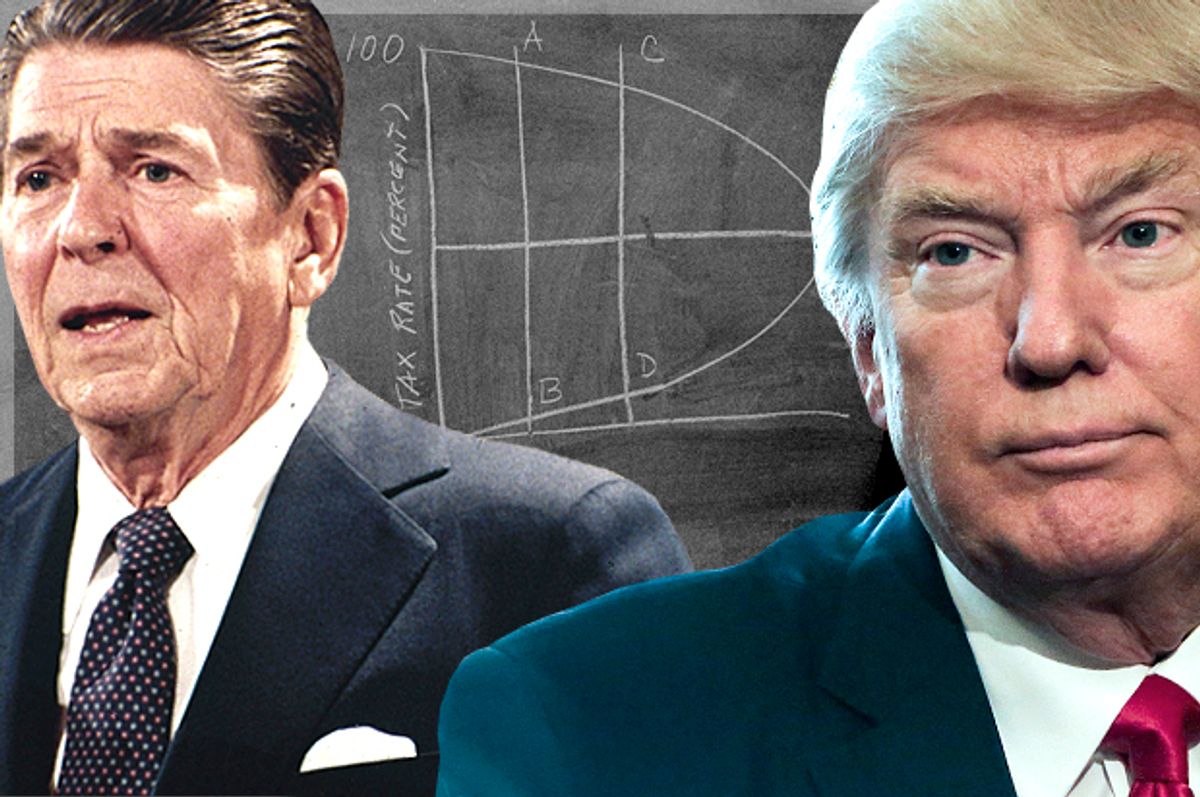Last week, President Donald Trump appeared to unwittingly praise his predecessor's economic policies when he tweeted the following complaint:
The entire premise of Trump’s childish tweet — that he somehow deserves credit for debt reduction in his first month (and that President Obama deserved blame for a $200 billion increase in his first month) — is so demonstrably false that it is laughable.
“No one who knows anything about budgeting would take a 30-day change to have any meaning at all,” observed George Washington University professor Neil Buchanan to PolitiFact, who ruled Trump’s comment “mostly false." “There is no credit to take, because it's like noticing that rainfall numbers from one month to the next are not exactly the same or that attendance at baseball games is not a constant number.”
Considering that Trump hasn’t enacted any fiscal legislation since entering office, any reductions in the debt (or deficit) that are in fact attributable to fiscal policy -- rather than normal, day-to-day fluctuations in government revenue and spending -- would reflect the policies of President Obama. Thus, Trump was taking credit for Obama’s economic success, while at the same time blaming him for the policies of George W. Bush and the financial crisis he inherited.
While it is possible that Trump knew all this and was deliberately misleading his credulous supporters, it is more likely that the president was simply regurgitating misinformation from the right-wing echo chamber, as this tweet came shortly after Herman Cain made the same dubious assertion on Trump’s favorite morning program, “Fox and Friends.” (Cain, in turn, probably read this misleading factoid on the right-wing blog Gateway Pundit).
A few days after Trump tried to take credit for his Democratic predecessor’s fiscal policies, the president revealed his own fiscal plan in a budget that called for a massive $54 billion increase to the bloated defense budget — which is already bigger than the military spending of the next 10 or so countries combined — that was to be offset with cuts to the rest of the federal government, including the State Department and the Environmental Protection Agency. Unfortunately for Trump, even eliminating the entire EPA — as his new EPA head Scott Pruitt would like to do — wouldn’t come close to offsetting the defense increase, as the agency currently has a budget of just $8.2 billion.
The president went on to say during his speech to Congress that he planned to provide “massive tax relief” to the middle class — but from what we know about Trump’s planned tax cuts (looking at his campaign-trail plan), the top 1 percent of income earners would receive the biggest tax relief by far. According to an analysis by the Tax Policy Center, Trump’s tax plan would add more than $7 trillion to the debt over the next decade. Trump has previously claimed that these cuts would be deficit-neutral, however, because of the massive economic growth they would ignite. (Of course, if Trump ends up getting America into a trade war with Mexico or China, as he seems eager to do, the economy would first fall into a recession.)
If all of this sounds familiar, that’s because it is: infuriatingly familiar. Before there was Trump, there was Ronald Reagan, who essentially did what Trump wants to do: He substantially increased military spending and slashed taxes for the wealthy. Not surprisingly, Reagan’s first tax cut, which slashed the top income tax rate from 70 percent to 50 percent, reduced revenue by $208 billion (in 2012 dollars) in its first four years, while the 1986 tax reform bill — purported to be revenue-neutral — reduced revenue by “less than $1 billion four years after enactment.”
Throughout his presidency, Reagan was forced to sign several tax increases to make up for these reductions, but by the end of his presidency the debt had still almost tripled, from $1 trillion to $2.9 trillion. While supply-side dogma claims that massive tax cuts will spur growth and cause wealth at the top to “trickle down,” this has never panned out in reality. Economic inequality has returned to pre-Great Depression heights in America since the Reagan Revolution.
One of Reagan’s most prominent economic advisors, Arthur Laffer — who more recently advised Kansas Gov. Sam Brownback — has predictably cheered Trump’s intention to emulate Reagan’s supply-side experiment, predicting that his tax cuts will lead to economic “nirvana.” But Laffer was similarly bullish on Kansas when he advised Brownback to sign radical tax cuts five years ago, and economic nirvana has yet to arrive in the Sunflower State. Duane Goossen, the former budget director of Kansas, observed last October that the Brownback experiment “broke the state budget and imperiled education, highways, and key services without delivering the promised economic jolt,” and has unflatteringly called Trump’s economic plan “Brownback Economics for America.”
Trump has proven time and again to have a shallow and limited understanding of the economy — but his economic council of billionaires and Wall Street executives doubtless know what they’re doing. Ultimately, supply-side economics is a dogma that was developed by corporate America and the business class to further their own class interests (see the “Powell Memo”), and viewed through that prism it has been a tremendous success. While supply-side policies have been disastrous for the majority of Americans (and for the overall health of the economy), the wealthiest Americans have seen their wealth surge, which explains why the dogma stubbornly persists.
In the end, whether Trump knows it or not, he is serving the interests of the wealthiest Americans and betraying the working people who voted for him. Like past Republican presidents, he has inherited a house in order. But he's about to throw a lavish party for all his rich friends, and when some hapless Democrat is left to clean up his mess, Donald will no doubt take to Twitter to remind everyone about how much he cut the debt in his very first month in office.



Shares